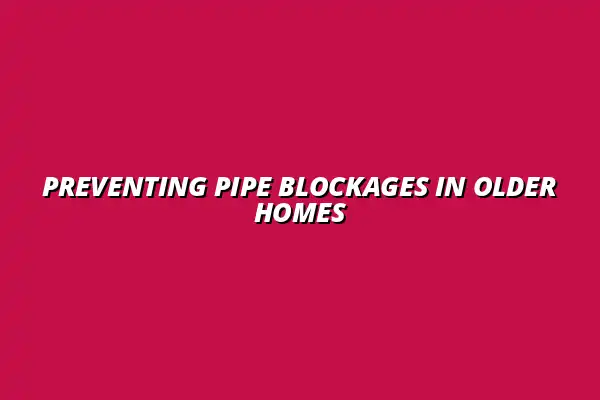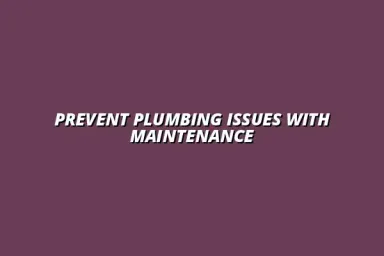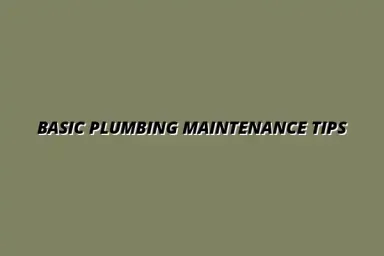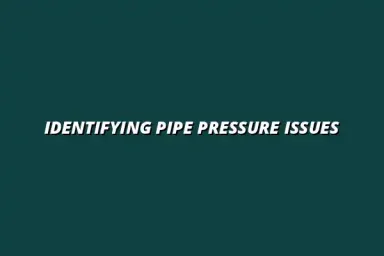Understanding Pipe Blockages in Older Homes
Dealing with pipe blockages in older homes can be a real headache! As plumbing systems age, they become more susceptible to various issues. Understanding the common causes and signs of potential blockages can help homeowners take necessary actions before problems escalate.
The Common Causes of Pipe Blockages in Aging Plumbing Systems
In older plumbing systems, several factors contribute to pipe blockages. These issues often stem from years of use, leading to wear and tear. By recognizing these common causes, homeowners can be proactive in preventing future problems. Regular maintenance, as described in this guide to essential plumbing maintenance for homes, is crucial.
Accumulation of Debris and Grease
One of the main culprits behind pipe blockages is the buildup of debris and grease. Over time, hair, soap residues, and cooking oils can accumulate in the pipes, leading to obstructions. Regular cleaning and proper disposal methods can significantly reduce this buildup.
- Use a drain strainer to catch debris before it enters the pipes.
- Wipe greasy pots and pans with paper towels before washing them.
- Avoid flushing items like cotton swabs and wipes down the toilet.
Scale Build-Up in Pipes
Another common issue is scale build-up caused by mineral deposits, especially in areas with hard water. This build-up can narrow the pipes, restricting water flow and increasing the risk of blockages. Homeowners may need to consider water softeners or regular descaling solutions to combat this problem. Understanding how to prevent pipe corrosion at home is also vital.
Tree Roots Intrusion
Believe it or not, tree roots can wreak havoc on plumbing systems! As trees grow, their roots can infiltrate underground pipes, causing serious blockages. Regular inspections can help detect these issues early and prevent costly repairs. For issues related to water pressure and old pipes, check out this article on old pipes and water pressure issues.
Signs Indicating Potential Pipe Blockages
Being able to identify early signs of pipe blockages is key to maintaining a healthy plumbing system. Ignoring these signals can lead to more severe issues down the line, so it's important to stay vigilant. Preventing bathroom drain clogging year-round is crucial, and you can find helpful tips here.
Slow Draining Sinks and Bathtubs
If you notice that water is draining slowly from your sinks or bathtubs, it could be a sign of a blockage. This symptom often indicates a buildup of debris that needs attention. Taking action early can prevent a complete blockage and potential flooding!
Unpleasant Odors from Drains
Another telltale sign of a pipe blockage is unpleasant odors coming from your drains. These smells can indicate trapped food or other organic matter decomposing within the pipes. Addressing these odors quickly can help maintain a fresh-smelling home.
Frequent Backups in Toilets
Frequent toilet backups are not just an inconvenience; they often signal serious plumbing issues. If your toilet regularly backs up, it’s time to investigate potential blockages. Ignoring this could lead to costly repairs and unhygienic conditions! Learn more about tips to prevent pipe backups to avoid this.
Frequently Asked Questions about Pipe Blockages
When it comes to pipe blockages, homeowners often have many questions. This section covers some of the most common inquiries regarding how to handle and prevent these pesky plumbing issues. Knowing the best methods can save time, money, and headaches down the line!
Understanding the answers to these questions will empower you to take proactive steps in maintaining your plumbing system. Let's dive into some frequently asked questions related to pipe blockages!
What are the best methods to clear minor blockages?
For small blockages, there are several effective methods to consider. These strategies can often clear the clog without requiring professional help. Here are some popular options:
- Plunger: A trusty plunger can work wonders! Make sure to use the right type for sinks or toilets.
- Baking Soda and Vinegar: This natural combination can help dissolve minor clogs. Pour baking soda down the drain, followed by vinegar, and let it fizz.
- Boiling Water: Pouring hot water can help melt away grease or soap buildup. Just be cautious with PVC pipes!
- Drain Snake: A drain snake or auger is a handy tool that can manually dislodge blockages deep in the pipes.
Always remember to take precautions when attempting to clear blockages. If the problem persists, it might be time to call in a professional plumber, such as a plumber in Billesley, Birmingham (example).
How often should homeowners inspect their plumbing systems?
Regular inspections can make a significant difference in maintaining a healthy plumbing system. I recommend conducting inspections at least once a year. However, if your home is older or you've noticed issues, more frequent checks may be needed.
During these inspections, look for signs of wear, leaks, or blockages. Here’s a simple checklist to follow:
- Check for slow drains in sinks and tubs.
- Look for any visible leaks around fixtures and pipes. Preventing water heater leaks is important, and you can learn how here.
- Examine toilets for signs of constant running or odd noises.
- Inspect the water pressure and quality.
By keeping an eye on your plumbing, you can catch potential issues early and avoid costly repairs!
Can I use chemical products to prevent pipe blockages?
Chemical drain cleaners are tempting since they promise quick results. However, they may not always be the best solution. Many of these products can be harsh on your pipes and the environment!
Instead of relying solely on chemicals, consider these safer alternatives:
- Enzyme-based cleaners: These are less damaging and can break down organic matter more naturally.
- Regular maintenance: Consistent cleaning practices can go a long way in preventing blockages without the need for harsh chemicals.
- Homemade solutions: As mentioned earlier, baking soda and vinegar can be a great way to keep drains clear.
Keep in mind that while chemicals might provide temporary relief, they should not be a permanent fix. Always focus on preventive measures for the best results!
Summary of Key Preventive Measures
Maintaining a plumbing system can seem daunting, but with the right practices, it doesn't have to be. A few simple strategies can help you avoid the stress of pipe blockages!
Through regular maintenance, effective cleaning practices, and good disposal habits, you can protect your home’s plumbing. Let’s recap some key preventive measures:
Recap of Maintenance and Cleaning Practices
Consistent maintenance and cleaning are essential to a well-functioning plumbing system. Here’s a list to remember:
- Schedule professional plumbing inspections at least once a year.
- Use eco-friendly cleaners or natural remedies regularly.
- Be mindful of what goes down your drains.
- Flush your drains with hot water periodically.
By following these steps, you can significantly reduce the risk of blockages and keep your plumbing in great shape!
Final Thoughts on Maintaining Healthy Plumbing Systems
In conclusion, taking care of your plumbing doesn’t have to be a chore. With proper attention and preventive strategies, you can enjoy smooth water flow and avoid costly repairs!
Always stay proactive, and don’t hesitate to reach out to professionals when needed. By doing so, you’ll ensure that your home’s plumbing remains in top form for years to come!

 Kiran Almasi
Kiran Almasi

